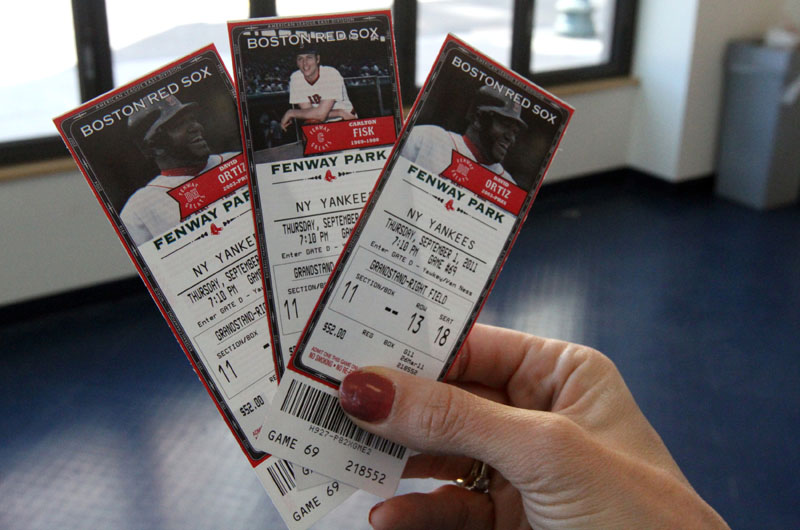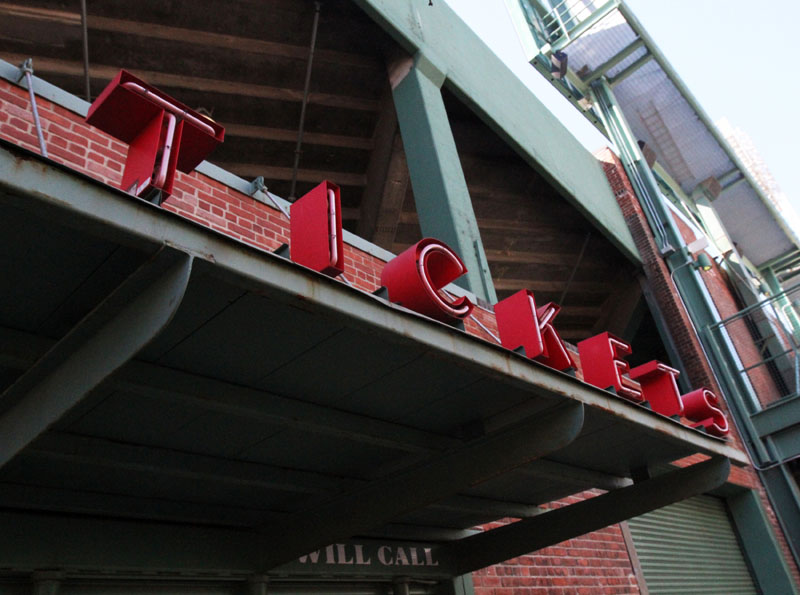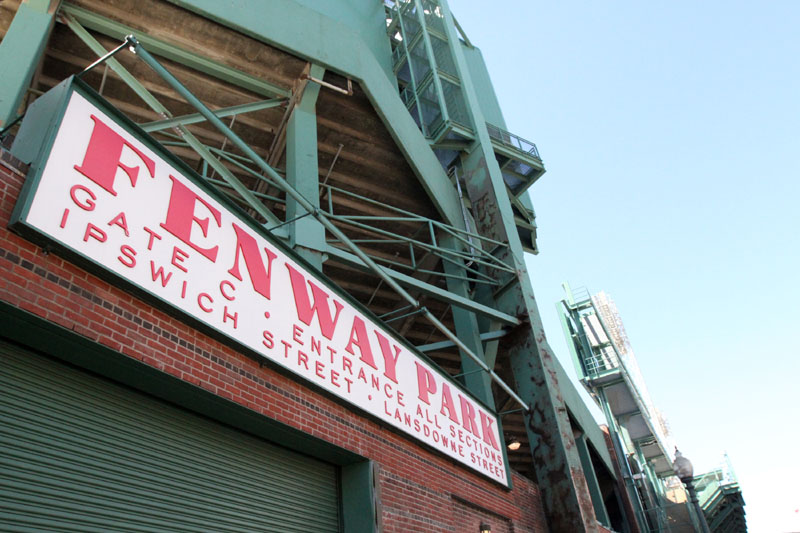If opening day at Fenway this coming Friday has you dreaming about Red Sox tickets for this season, here’s some advice — keep dreaming.
Your chances of getting a decent seat at face value for a game worth seeing are slim and getting slimmer.
A week before opening day, 85 percent of this season’s tickets are already sold.
The New England Center for Investigative Reporting has taken a close look at why so few tickets are available and here are some answers.
Gone is the cream of the ticket inventory, weekend games against other top teams. The vast majority — nearly 70 percent of tickets sold to date — were reserved months or even years ago by corporations and individual season ticket holders or scooped up by ticket resellers, according to an analysis of team seat sales confirmed by the Red Sox. And ticket sellers have taken another bite as well out of remaining tickets, including bleacher and grandstand seats, which are typically the haven of the average fan.
Those fans forced to buy tickets from resellers face the prospect of shelling out hefty premiums, with the average price of a Sox ticket on the secondary market having hit $117, according to SeatGeek.com.
That’s up from $104 the same time last year and nearly double the average face value of Sox tickets, already one of the highest in baseball.
John Murphy, a groundskeeper at a local college, fondly recalls his college days a decade ago before the team’s popularity reached new heights. Then he was able to leisurely walk up to Fenway at game time and purchase a ticket, but no more.
Now he counts himself lucky if he can buy a ticket online for one game each season — standing room only.
“I used to go to a lot more games than I do now,” Murphy said. “Price is definitely a factor.”
One key factor helping fuel the Fenway ticket crunch has been the steady expansion of luxury seating in baseball’s oldest and smallest major league ballpark.
Before prized new slugger Carl Crawford even takes his first at-bat for the Sox, companies with long-term contracts for luxury perches and individual season ticket holders, many of them also corporate customers, have locked up the majority of tickets sold so far.
And, after a decade-long, $285 million renovation and expansion of Fenway, there are now thousands of luxury and upscale seats catering to companies and fans who can afford to shell out anywhere from $115 to well more than $200 a game.
The average ticket price has nearly doubled since 2000, with the Sox at an average of $52.32 a game, just a few cents behind the Chicago Cubs, the league leader in the dubious category of most expensive baseball tickets in the nation.
Ticket resellers play a double role. First, ticket brokers like Ace Tickets regularly resell season tickets and luxury perches controlled by companies or wealthy individuals, often for double or more their face value depending on interest in the game.
But the resellers even compete aggressively for the bleacher, grandstand and other seats that are some of the remaining havens for those fans without corporate connections or deep pockets.
Often they don’t have to do the dirty work themselves. They scoop up these tickets from other brokers or just fans who lucked out and got a few more seats than they needed.
What percent of such individual game tickets wind up in the hands of resellers is hard to estimate, team officials contend.
Overall, Ron Bumgarner, the Sox ticket office chief, estimates as much as 30 percent of each season’s entire ticket inventory finds its way onto the secondary market.
But he won’t venture a guess at what proportion of individual game tickets that are meant for the average fan wind up in the hands of ticket brokers.
Rather, he contends that the “vast majority” of tickets resold are parceled out by season ticket holders, who can’t make it to all 81 home games, along with luxury seat holders, such as companies.
One broker at a ticket agency in Boston, who would only give his first name, Mike, estimated that as many as 20 percent of individual game day tickets originally purchased by a fan wind up being resold by brokers like him.
If that were the case, that would push the proportion of tickets out of reach to the average fan, already at 70 percent, past the 75 percent mark.
Nova Scotia native Paul Burke, who is at MIT doing post-doctoral work in engineering, got a rude awakening to the challenges facing Red Sox fans.
Noting that his college roommate was a Sox fanatic, Burke had high hopes of taking his 2-year-old son to a game at Fenway. But those were dashed when he found out that colleagues were competing in a university-sponsored lottery, all for the right to buy Sox tickets.
He put his name in but came up short.
“I just thought I’d walk up to the ticket booth and say, ‘Two tickets please,’ ” Burke said. “It was kind of disappointing. I was looking forward to taking my son to a game.”
For its part, the team touts its efforts to stop resellers from grabbing game-day tickets that have become one of the last portals into Fenway for the average Sox fan.
Hundreds of tickets are reserved for sale at the ballpark’s ticket office just before the game — if you luck out and score a seat, you are ushered directly into the ballpark, Bumgarner said.
During the preseason, the Sox also hold a series of online lotteries for tickets to the hottest games in a bid to weed out resellers. About 60,000 out of a total of 200,000 who took part in the random drawing walked away with the chance to buy multiple game-day tickets at face value, according to Bumgarner.
“We want to give as many different people as possible the chance to come to a game at Fenway in the belief that they will be more invested in the team,” he said. “It’s a long-term strategy.”
In fact, Bumgarner notes that for fans who still want to go to a game at Fenway — and who are willing to be flexible about the opponent, the day or the type of seat — can still get a ticket through the team. There’s even the possibility of getting into a more coveted game if a fan is willing to check frequently for tickets.
For example, tickets from a group sale might get turned back into the ticket office at the last minute.
“Don’t give up,” he advises. “There are still tickets available for most games throughout the season.”
But a look at tickets for sale on ticket broker websites reveals what appear to be dozens if not hundreds of grandstand, bleacher and other more plebian seats available for Opening Day’s coveted showdown with the Yankees. (There are also countless tickets on sites like eBay that enable fans and others to put tickets up for bid directly, without working through a middleman.)
And even as they tout efforts to keep resellers in check, the Sox front-office has conferred a level of legitimacy on resellers that would have been unthinkable once.
Ace Tickets cut a landmark sponsorship deal with the Red Sox in 2007.
Team executives say the deal does not involve enhanced access to tickets, something that Jim Holzman, Ace’s chief executive, also insists on. Ace gets the exposure and advertising bump that comes with being a Red Sox sponsor.
However, Holzman also boasts of sitting on $5 million worth of inventory — most of which is stored in a secure location and transported by armored car. While he won’t break out the value of his Sox holdings in that ticket pool, in an interview last year Holzman said he had bought up more than 40,000 Sox tickets before the start of the 2010 season. While declining to offer an estimate, he said that number is in the ballpark for this season’s inventory of Sox tickets as well.
“We have five people and all they do, all day long, is deal with people selling (Sox) tickets,” Holzman said. “Fenway Park is a very magical place and people just want to go there and be there.”
Despite the obvious resale value of Sox tickets, Holzman contends that savvy fans can still get a deal, even if they are forced to buy through a broker. Depending on the team’s fortunes during the season, interest in the Sox — and prices on the secondary market — will ebb and flow. That means he will wind up selling tickets for less than face value.
Holzman contends his brokers buy tickets directly from fans and from other brokers as well, paying a markup before reselling them again at a higher price.
Ace and firms like it operate under an antiquated and ambiguous state anti-scalping law that, on paper, prohibits the resale of tickets for more than $2 over face value. However, there are exceptions built in for “service charges related to the obtaining and selling of that ticket,” wrote Terrel Harris, a spokesman for the state Department of Public Safety, in an email. Examples of such add-ons include long-distance phone calls, messenger charges and postage, he noted.
Not alone, Ace is just one of 85 licensed ticket resellers in Massachusetts.
“There are times that we lose and times that we win,” Holzman said.
Still, fans competing for the limited number of single-game Sox tickets also have to compete with corporate sponsors and even occasionally celebrities and local politicians as well.
The Sox now have a lineup of 100 sponsors, each with deals that often include tickets to games. While some of these fall under the season ticket category, some ticket requests also come out of the general seating sections as well, Bumgarner acknowledged.
The Sox front office keeps a “small” amount of tickets in reserve for such sponsor requests, as well as other team owners or visiting celebrities.
Bumgarner, the team’s ticket chief, declined to offer a breakdown on how many tickets are put on reserve for different groups, such as sponsors, the Red Sox Foundation, umpires, coaches, visiting team players and coaches and franchise employees.
“This number varies from game to game depending on time of year, day of week, opponent, weather, competition in market, team performance, etc.,” Bumgarner wrote in an e-mail. “Please consider that the vast majority of these tickets are requested for regular fans by the aforementioned parties.”
Team executives contend the upgrades and the addition of thousands of seats to Fenway have been an unalloyed success and are balanced by efforts to keep the ballpark open to a wide range of fans.
Nearly a decade since taking over the Sox, John Henry’s ownership group has managed to field one of sports highest paid lineups by squeezing more dollars than ever thought possible from Major League Baseball’s smallest ballpark.
But to get there, team executives have turned increasingly to Boston’s corporate sector to foot the bill, boosting the percentage of pricier season ticket, club and luxury seats over the past decade to a majority of the ballpark.
Henry, a hedge fund wizard, teamed up with West Coast TV producer Tom Werner and a team of investors to buy the Sox for more than $700 million in early 2002.
The new owners inherited the antique ballpark that outgoing Yawkey Trust chief John Harrington had deemed unsalvageable, to the point of spending years pushing plans to build a replacement.
Instead, Henry and his team scrapped plans for a new stadium and pumped $285 million into a years-long renovation and expansion of the 1912 ballpark. The investment, in turn, sparked a surge of real estate development around Fenway that precludes any future moves to build a bigger ballpark in what is now a increasingly pricey neighborhood.
When it comes to raw revenue, that investment, in turn, has paid dividends.
On their way to two championships, the Sox have become one of the top cash generating machines in baseball, having more than doubled revenue to $266 million last year, according to Forbes. The magazine now lists the Sox as the second most valuable team in baseball, second only to the Yankees.
But that success has come at a price, with the number of seats at Fenway reserved for season ticket holders — a category that includes luxury seats under multi-year contracts and corporate suites — having risen from roughly 48 percent in the Yawkey era to a majority now of all seats in the ballpark.
One key driver of this luxury boom has been an expansion at Fenway that has boosted seating capacity from 34,000 to just under 37,500 today.
Many of the new seats are luxury perches that cost more than $200 a game, with the team effectively leasing them to wealthy fans and corporations under deals ranging from three to seven years long.
During the Yawkey era, the 600-seat .406 Club was the main luxury venue. Today the corporate sections have steadily proliferated, with the new State Street Pavilion and the EMC Club among the new corporate seating sections.
Not that the Sox are alone in embracing the buttoned down, corporate fan. The Yankees, Mets and Cowboys all built new stadiums in the last few years that were loaded with luxury seats.
In fact, the Fenway expansion is part of a long-term trend towards additional luxury seating that cuts across the sports world, said Andrew Zimbalist, an economist and sports business expert at Smith College. If anything, the Sox have been restrained compared to other franchises.
“It’s true, not just at Fenway,” Zimbalist said. “It’s true in every single stadium, both professional and college.
The Sox contend there is still significant diversity even among season ticket holders, despite costs that can range from a few thousand to tens of thousands of dollars for a single season.
While acknowledging that 50 percent of all season ticket holders might now be companies, Bumgarner, the team’s ticket office chief, notes there are many individual season ticket holders who are not companies and are not wealthy. These fans come up with the money for tickets to 81 games by splitting the cost with friends or associates or selling some of their tickets throughout the season.
Still it is an increasingly hard club to get into. Three years after their purchase by Henry’s investment group, the Sox set up the first ever season ticket waiting list. It’s now up to 8,000 names.
Meanwhile, caught in the squeeze between the growing number of luxury seats at Fenway and ticket resellers have been fans without the deep-pockets for season tickets or club seats.
Michael Rutstein, publisher of Boston Baseball, has seen a sea change at Fenway during the 15 years he has hawked his magazine in the streets outside the ballpark, with the crowds growing more upscale and corporate.
In the old days, it was not uncommon for fans to bring their own scorecards. Now he wonders how many would be able to even keep track.
“The fans who are coming to the games are no longer the ones who care most passionately about the team,” he said. “They are the ones who were able to get tickets. As the price has gone up, the crowds have gotten steadily more upscale.”
Sox fans without big bucks or connections are relying on whatever connections they have to drum up tickets to get inside the ballpark.
Michael Krakofsky, a downtown Boston chef, counts himself lucky to have a good friend who works for a ticket broker, but even that has limits.
“I haven’t gone to a Yankee game,” Krakofsky said as he walked out of the waterfront hotel he works at, decked out in a Red Sox sweatshirt.
“I won’t pay $200 for a bleacher seat,” he said. “That’s foolish.”
The New England Center for Investigative Reporting (www.necir-bu.org) is a nonprofit investigative reporting newsroom based at Boston University.
Send questions/comments to the editors.





Success. Please wait for the page to reload. If the page does not reload within 5 seconds, please refresh the page.
Enter your email and password to access comments.
Hi, to comment on stories you must . This profile is in addition to your subscription and website login.
Already have a commenting profile? .
Invalid username/password.
Please check your email to confirm and complete your registration.
Only subscribers are eligible to post comments. Please subscribe or login first for digital access. Here’s why.
Use the form below to reset your password. When you've submitted your account email, we will send an email with a reset code.